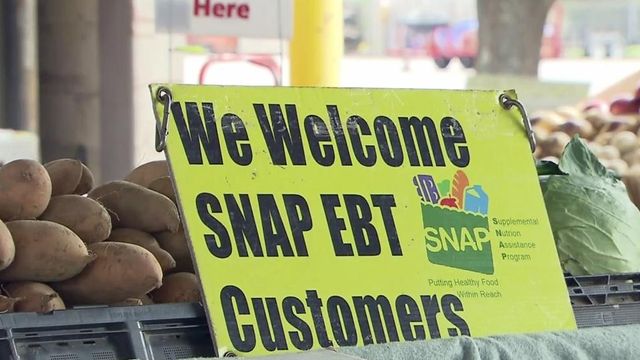Prolonged government shutdown could hurt families on food stamps
Thousands of North Carolina families who receive food assistance could go hungry if the partial federal government shutdown continues for a few more weeks.
Posted — UpdatedThe U.S. Department of Agriculture is among the agencies affected by the the shutdown, which began more than two weeks ago. The USDA supervises the Supplemental Nutrition Assistance Program (SNAP or food stamps) and the Women, Infants and Children program (WIC) at the federal level.
Congress hasn't allocated any money for the programs beyond January. Although there is some emergency funding available, it's not enough to cover all food stamps or WIC recipients nationwide for February, officials said.
"We are confident that we have funding to continue services, and if there’s any changes to their services, they should let us know right away and we will address that with individual counties," Susan Perry-Manning, principle deputy secretary of the North Carolina Department of Health and Human Services, said Monday. "We want to make sure there’s no disruption to anybody’s services, and at this time, we have funding into February."
But what happens if the shutdown drags on into February?
"We certainly hope that the president and Congress will reach a deal long before then," Perry-Manning said. "At this time, we have adequate funding, and we are going to continue to work closely with our federal partners to develop any kind of contingency plans to continue to deliver services as long as possible to folks."
Dottie Rosenbaum, a senior fellow at the Center for Budget and Policy Priorities, told NBC News that the average family on food stamps stands to lose about $90 of the $245 in assistance they receive each month.
"Even if the president and Congress resolve the shutdown by February, depending on the decisions the administration makes in the coming one to two weeks, households could experience a substantial delay in receiving their full SNAP allotment for February because of the operational challenges that states and EBT contractors face," Rosenbaum said.
The Food Bank of Central and Eastern North Carolina, which gets about 10 percent of its funds from the federal food programs, is watching the shutdown closely, spokeswoman Jessica Whichard said.
"We're working with our partner agencies – that network of nonprofit pantries and soup kitchens – to make sure that they are ready with food should the situation change for folks who are needing it," Whichard said.
Although the food bank is funded for January, its federal support would end in February if government operations don't resume.
"On top of our everyday 600,000 people in our service area not knowing where their next meal will come from, you add in [Hurricane Florence], which really caused a lot of pain for folks, and then you add in a government shutdown for folks who were already trying to recover from that, it's going to be very tough," Whichard said.
"Children and families need to eat, and while North Carolina is bridging the gap for now, we need the president and Congress to work together to fund the federal government and end this uncertainty," North Carolina Gov. Roy Cooper said in a statement. "The shutdown is also delaying hurricane recovery, and the longer it drags on, the longer it will take for North Carolina to get access to federal funds needed for long-term rebuilding."
One supermarket chain in Indiana has already started turning away customers who want to pay with EBT and food stamps.
"Our machines weren't taking any EBT cards and we didn't really know what was going on. We didn't know if it was a technical issue, and then we found out it was due to the government shutting down," Tristen Malone of the Clay City IGA told CNN.
Cashiers say customers are angry.
"They're really upset about it, which is understandable. I mean that's like, you know, really discouraging that they can't use it. And I mean we've had some people even get mad about it but it's like out of our control, there's nothing we can do about it," Malone said.
Until the government is up and running again, folks in Clay City will have to look for other sources for groceries.
"I'd say the food pantries are going to be booming as far as people going there for food," Rachel Lynch said.
No such problems were reported in North Carolina.
Related Topics
• Credits
Copyright 2024 by WRAL.com and CNN. All rights reserved. This material may not be published, broadcast, rewritten or redistributed.





